Adaptive water sports offer powerful healing paths for veterans through activities like surfing, swimming, kayaking, and sailing. You’ll find remarkable benefits including a 36% decrease in PTSD symptoms through ocean therapy and enhanced physical strength from water’s buoyancy. Programs like Operation Surf and VA-funded initiatives provide specialized equipment and training regardless of disability level. The combination of water’s calming properties and community connection creates transformative experiences that extend far beyond the waves.
10 Best Adaptive Sports Healing Veterans Through Waves
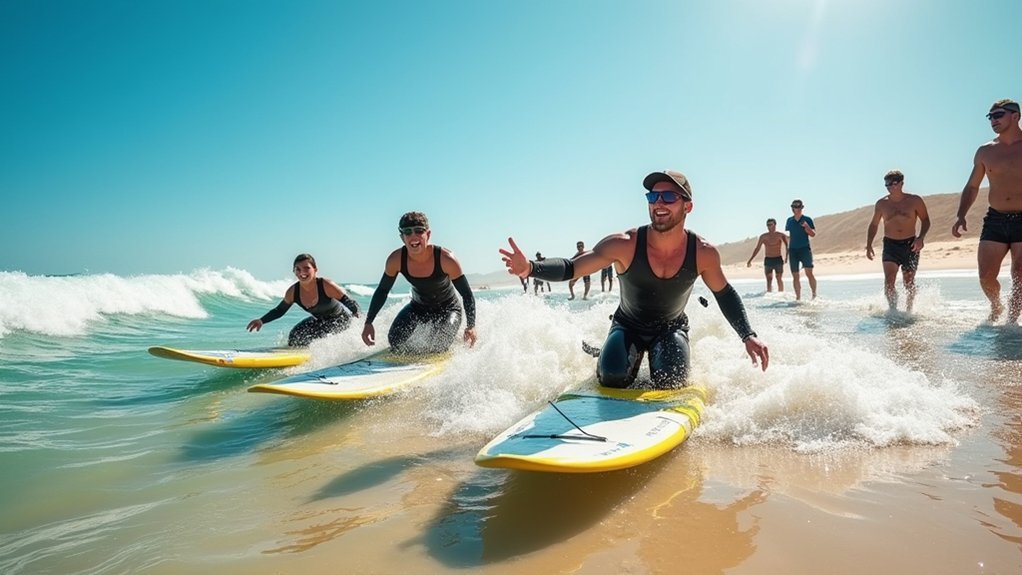
While many adaptive sports offer therapeutic benefits, water-based activities stand out for their unique healing properties for veterans.
Adaptive swimming provides a low-impact environment that reduces strain on joints while building strength and endurance. You’ll find the buoyancy of water creates a supportive medium for movement that might be difficult on land.
The weightless embrace of water enables freedom of movement while strengthening muscles that land-based therapy cannot access.
Water sports create a calming effect that can ease PTSD symptoms and anxiety. When you’re immersed in water, the sensory experience helps ground you in the present moment.
The Department of Veterans Affairs recognizes these benefits, offering dedicated swimming programs nationwide. These programs represent just one aspect of the VA’s commitment to adaptive sports and arts that focus on enhancing physical and mental health.
Beyond physical rehabilitation, the social aspect of water sports fosters camaraderie. You’ll connect with fellow veterans facing similar challenges, building a support network that extends beyond the pool and into everyday life.
How Adaptive Surfing Transforms Veterans’ Recovery Journeys
When veterans first ride a wave successfully, they often experience a profound moment of transformation that extends far beyond the physical act of surfing. This achievement marks the beginning of a holistic recovery journey where physical and mental healing work in tandem. Operation Surf’s programs have demonstrated a remarkable 36% decrease in PTSD symptoms among participating veterans.
| Impact Area | Transformation |
|---|---|
| Physical Health | Improved strength, flexibility, and cardiovascular function while naturally relieving pain |
| Mental Wellbeing | Reduced PTSD, anxiety, and depression through mindfulness and oceanic therapy |
| Community Connection | Rebuilt sense of belonging and camaraderie through shared challenges |
You’ll find that adaptive surfing programs like Waves of Valor create inclusive environments where your specific needs are addressed. Whether you’re managing a traumatic brain injury, amputation, or PTSD, these supportive communities help you rebuild confidence while developing practical skills that transfer to everyday life.
Therapeutic Benefits of Aquatic Physical Therapy for Combat Injuries
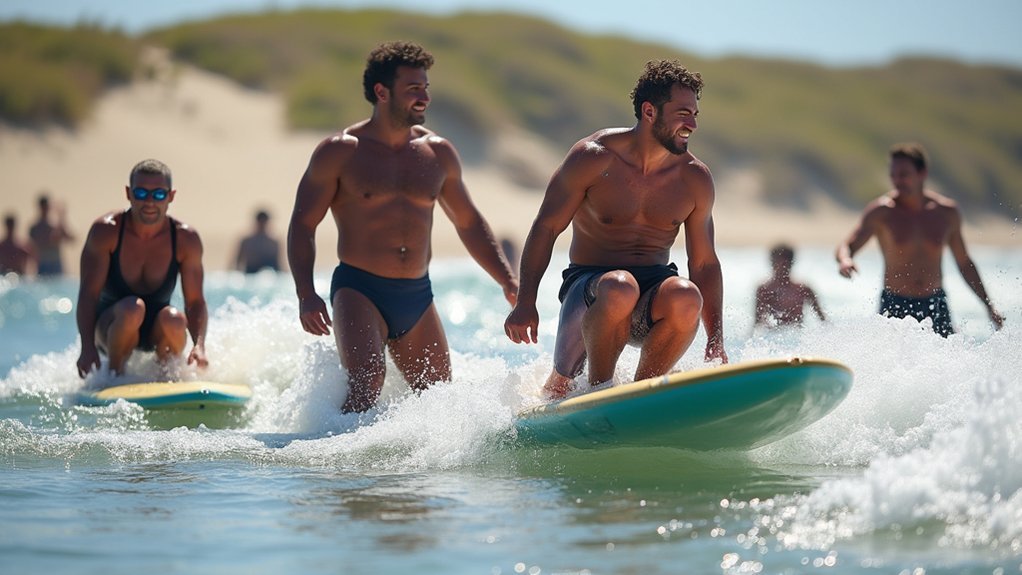
Water’s natural resistance provides you with a total-body workout that builds strength without the strain of traditional land exercises.
The buoyancy effect dramatically reduces pressure on your injured joints, allowing pain-free movement that wouldn’t be possible outside the pool.
Beyond physical benefits, aquatic therapy offers powerful relief for PTSD symptoms through the calming, meditative properties of water immersion combined with structured therapeutic techniques. The warm water environment promotes increased circulation and helps decrease swelling in injured areas, enhancing overall recovery time for veterans with combat-related injuries.
Water Resistance Training Benefits
Although often overlooked in traditional rehabilitation programs, aquatic physical therapy offers exceptional therapeutic benefits for veterans recovering from combat injuries. The natural resistance of water creates an ideal environment to rebuild strength without risking re-injury.
You’ll experience strength gains while protecting vulnerable joints—water resistance provides 12 times more resistance than air without the harsh impact of land exercises. Your muscles work harder with each movement, yet the buoyancy supports your body weight, reducing strain on healing tissues.
This balanced approach allows you to safely push your limits earlier in recovery. Veterans with various combat injuries can perform challenging exercises that would be impossible on land, accelerating rehabilitation timelines while building both strength and endurance through customized progressive resistance training. The innovative underwater treadmills keep veterans active throughout their recovery journey while minimizing pain.
Buoyancy Reduces Joint Stress
The therapeutic magic of buoyancy creates an almost weightless environment where your injured joints can finally find relief.
You’ll experience considerably reduced pressure on damaged tissues, allowing for pain-free movement that’s simply impossible during land-based therapy.
When you enter the water for rehabilitation, you’ll benefit from:
- Up to 90% reduction in weight-bearing pressure, minimizing pain during movement
- Lower risk of re-injury while strengthening supporting muscles
- Improved mobility and range of motion without painful stress
- Enhanced comfort that reduces anxiety during challenging rehabilitation exercises
This unique environment enables effective exercise routines even if you’re unable to perform similar movements on land, making aquatic therapy an ideal option for veterans with combat-related injuries. Veterans with conditions such as spinal cord injuries can particularly benefit from the supportive nature of water-based therapy programs.
Aquatic PTSD Relief Techniques
Immersing yourself in warm water not only helps heal physical injuries but can also calm the invisible wounds of trauma. Water therapy at 33°C (92°F) reduces intrusive thoughts while creating a non-stigmatizing environment where you’ll feel less judged during recovery. Danish veterans participating in the program have received treatment in water at 34-35 degrees Celsius, which is optimal for therapeutic benefits.
| PTSD Symptom | Aquatic Benefit | Application |
|---|---|---|
| Anxiety | Promotes relaxation | Warm immersion |
| Intrusive thoughts | Enhances mental control | Mindfulness exercises |
| Social isolation | Builds camaraderie | Group sessions |
| Chronic stress | Reduces cortisol levels | Regular immersion |
| Physical tension | Improves body awareness | Tai Chi/yoga in water |
Veterans report significant reduction in PTSD symptoms through aquatic therapy. The combination of physical resistance, buoyancy, and calming properties makes water an ideal medium for both physical and psychological healing. You’ll likely find the warm embrace of water a welcome complement to traditional PTSD treatments.
Sailing Beyond Limitations: Adaptive Sailing Programs for Veterans
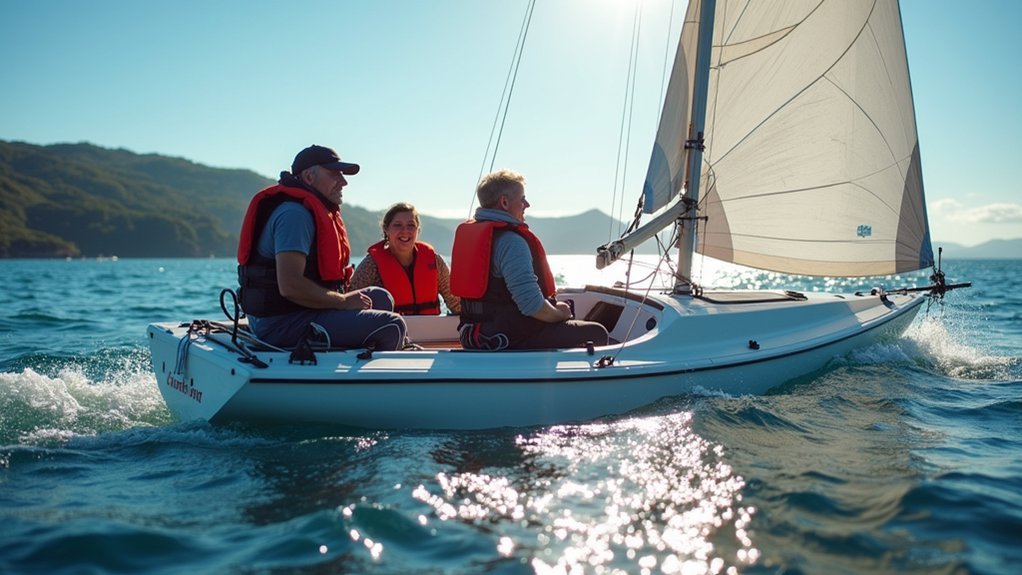
Designed specifically for veterans facing physical and psychological challenges, adaptive sailing programs have emerged as powerful vehicles for rehabilitation and reintegration. Programs like Soldiers Under Sail and Valhalla Sailing offer year-round opportunities for veterans of all skill levels to experience the therapeutic benefits of being on the water.
You’ll discover multiple benefits when participating in these programs:
- Improved mental wellness through nature-based therapy and stress relief
- Enhanced social connection with fellow veterans in a supportive community
- Access to adaptive equipment ensuring equal participation regardless of disability
- Skill development opportunities, including certifications like US Sailing’s Basic Keelboat
Whether you’re looking for recreational sailing or competitive racing through events like Heroes on the Hudson, these programs create pathways to healing while building confidence and camaraderie. Veterans can participate in both instructional and social sails at Pier 66 throughout the sailing season from May to October.
Competitive Water Sports Building Veteran Camaraderie and Confidence
When veterans engage in competitive water sports, they discover more than just physical activity—they find a powerful avenue for building meaningful connections and rediscovering their inner strength.
Through programs like Team Semper Fi and the Veterans Adaptive Learn To Ski Program, you’ll compete alongside peers who share similar experiences, fostering camaraderie vital for emotional recovery.
These competitive environments help you push past perceived limitations while developing new skills. You’ll experience the confidence that comes from achieving goals you might’ve thought impossible. The sense of accomplishment enhances your self-efficacy and overall well-being.
Beyond individual growth, you’ll build support networks important for post-military life. As you adapt to challenges in water sports, you’ll find yourself part of a community where belonging isn’t just possible—it’s guaranteed. The program’s expansion to 14 clinics nationwide demonstrates the growing recognition of water sports’ healing potential for veterans with various disabilities.
From Service to Surfer: Veterans Finding Peace Through Ocean Therapy
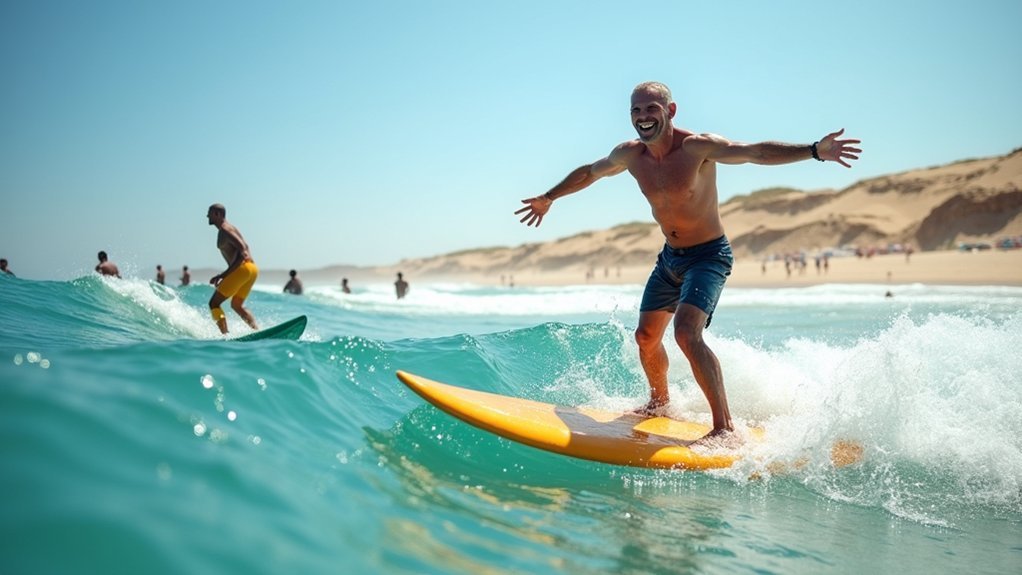
The ocean’s rhythmic waves offer a powerful healing sanctuary for veterans shifting from battlefield to beachfront.
You’ll discover how ocean therapy provides not just recreation, but profound healing for those who’ve served.
Ocean therapy delivers remarkable results for veterans:
- Measurable mental health improvements – 36% reduction in PTSD symptoms and 47% decrease in depression
- Enhanced self-efficacy – 68% increase through conquering waves and learning new skills
- Community connection – Building lasting friendships and camaraderie beyond therapy sessions
- Holistic well-being – Combining physical challenges with emotional healing in nature’s sensory environment
The unique combination of surfing challenges, ocean safety education, and supportive community creates transformative experiences that help you rebuild resilience and renew purpose. Founded by Van Curaza, a big wave surfer, Operation Surf has transformed countless veterans’ lives through therapeutic surf sessions.
Specialized Equipment Making Water Sports Accessible for All Veterans
Innovative equipment breakthroughs have transformed water sports accessibility for veterans with diverse abilities.
You’ll find hydro foils that elevate boards above water, making them easier to manage with mobility challenges. Adaptive kayaks now feature adjustable footrests and seating to accommodate your specific needs.
Specialized surfboards with enhanced grips and paddles offer better control, while customizable life jackets provide extra support where you need it most.
Even scuba diving has become more accessible through weighted vests and sea scooters that enhance underwater mobility.
These water-based activities provide a structured environment similar to archery, which has proven effective as a therapeutic activity for veterans recovering from injuries.
Organizations like Disabled Sports USA and Veterans and Athletes United support your journey by providing equipment loans, specialized instruction, and community events.
These adaptations don’t just enable participation—they foster independence, build community connections, and contribute greatly to both physical rehabilitation and mental wellbeing.
The Mind-Body Connection: Mental Health Benefits of Adaptive Swimming
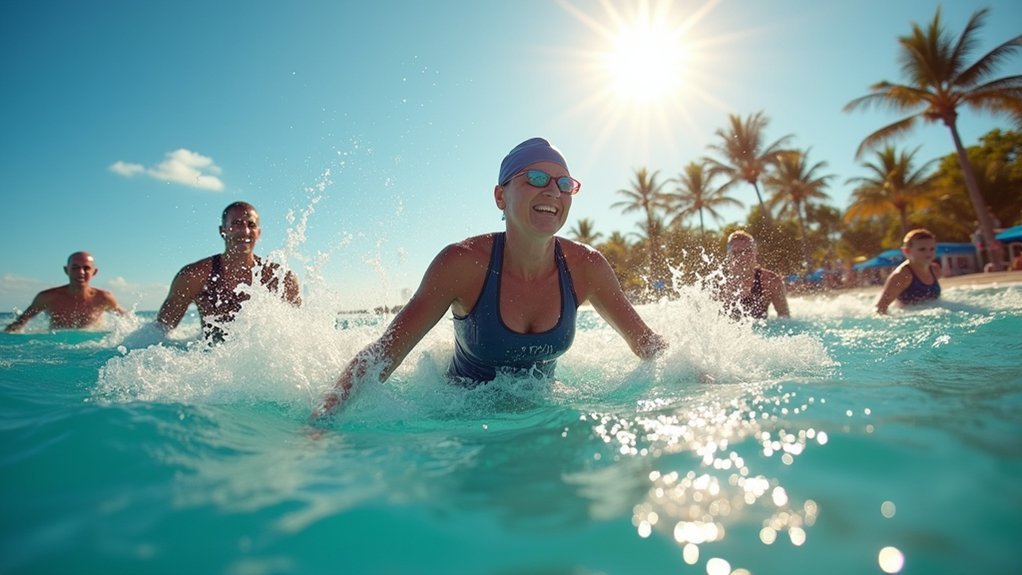
Beyond physical rehabilitation, adaptive swimming offers profound mental health benefits that many veterans discover once they enter the water. The therapeutic rhythm of swimming creates a unique mind-body connection that supports thorough healing.
When you participate in adaptive swimming programs, you’ll experience:
- Reduced PTSD symptoms and anxiety through the release of endorphins and increased serotonin levels
- Improved cognitive function from enhanced blood flow to the brain, supporting better memory and focus
- Social integration through shared experiences with fellow veterans, reducing isolation and building camaraderie
- Long-term mental wellness and emotional stability that extends beyond therapy sessions
The repetitive, meditative motions of swimming create a safe space for emotional processing while fostering discipline and routine—essential components of recovery and resilience. Studies show submersion in water during swimming activities decreases blood pressure and creates a natural calming effect beneficial for veterans managing stress responses.
Kayaking as Rehabilitation: Strengthening Warriors Inside and Out
Kayaking offers veterans a powerful combination of physical benefits, including improved cardiac health, core strength, and weight management.
You’ll find that paddling through water can reduce PTSD symptoms, depression, and anxiety while building mental resilience and self-efficacy.
As you join programs like Veterans Sea Kayak Resilience or Heroes on the Water, you’ll connect with fellow veterans who understand your journey, creating a supportive community that enhances your rehabilitation experience. Research shows that these peer outdoor experiences can effectively treat PTSD and help veterans successfully transition back to civilian life.
Physical Healing Benefits
The physical healing journey for veterans often begins on the water, where adaptive kayaking offers five distinct benefits for rehabilitation.
When you glide across water in a kayak, your body engages in a transformative workout that’s gentle on joints while delivering powerful results. Adaptive sports like kayaking have proven especially effective for veterans experiencing chronic pain and recovering from physical injuries.
Adaptive kayaking strengthens you physically through:
- Cardiovascular conditioning – improving heart health and reducing disease risk while building endurance
- Upper body and core strengthening – engaging muscles that support better stability and posture
- Balance and coordination development – requiring constant micro-adjustments that enhance overall mobility
- Weight management – burning calories during enjoyable sessions that don’t feel like traditional exercise
What makes kayaking exceptional is its accessibility – with modified equipment and specialized programs like Heroes on the Water making this healing sport available to veterans with various abilities.
Mental Fortitude Development
While the physical benefits of adaptive kayaking rebuild the body, its power to forge mental resilience proves equally transformative. The serene water environment creates the perfect setting for mindfulness practice, helping you focus on the present moment rather than past trauma.
You’ll discover how kayaking naturally induces a state of flow—where time seems to stand still and anxious thoughts fade away. Veterans consistently report reduced PTSD symptoms through this unique combination of nature-based healing and skill development.
The camaraderie found in kayaking groups provides an essential support network, fostering a sense of belonging that many veterans miss after service. Kayaking was highlighted as a favorite activity among veterans participating in the National Summer Sports Clinic, creating meaningful bonding experiences that strengthen emotional connections.
As you master new paddling techniques, you’ll build self-confidence that extends beyond the water. This holistic approach to mental fortitude development makes kayaking particularly effective in thorough rehabilitation programs.
Water-Based Community Building
Beyond individual healing, adaptive kayaking creates powerful communities where veterans discover renewed purpose through shared experiences.
You’ll find these water-based programs breaking down isolation barriers while challenging public perceptions about disabilities.
When you join adaptive kayaking events like Heroes on the Hudson or VA-sponsored clinics, you’re entering supportive environments designed for veterans of all abilities:
- Build meaningful connections with others who understand your unique challenges
- Engage your family in your rehabilitation journey, strengthening those essential relationships
- Develop new skills alongside peers facing similar obstacles
- Create lasting support networks that extend beyond the water
These communities don’t just improve your social integration—they showcase what’s possible when veterans unite through shared challenges and triumphs on the water. Recent research demonstrates that participating in week-long adaptive kayaking programs can lead to notable improvements in behavioral health, particularly for wounded, ill, and injured service members dealing with depression, anxiety, and PTSD.
VA Initiatives Supporting Veterans in Adaptive Water Sports Programs
Through extensive funding and strategic partnerships, VA initiatives have revolutionized adaptive water sports opportunities for veterans nationwide.
The VA Adaptive Sports Grant Program has invested over $119 million across nine years, creating robust water skiing and other adaptive sports programs accessible to veterans with disabilities.
With $119 million in funding, the VA has transformed adaptive water sports accessibility for disabled veterans nationwide.
You’ll find these programs throughout states like California, Florida, and Virginia, where specialized equipment and training guarantee you can participate regardless of your physical limitations.
The VA awards grants to non-federal organizations with proven experience managing large-scale adaptive sports programs.
If you’re interested in participating, you can connect with programs through your local VA medical center or check the VA website for a list of grant recipients in your area.
These initiatives help you build independence, improve health, and forge meaningful community connections. These activities are specifically designed to enhance both physical and mental health of veterans who participate in the programs.
Frequently Asked Questions
How Do Winter Adaptive Sports Compare to Water Sports for Veterans?
Winter adaptive sports offer snow-based therapy while water sports provide buoyancy support. You’ll find both build community and confidence, but your choice depends on your mobility needs and personal preferences.
What Funding Options Exist for Veterans Unable to Afford Equipment?
You’ll find multiple funding options including VA Adaptive Sports Grants, support from non-profits like Wounded Warrior Project, community partnerships offering discounts, and individual donations that help veterans access adaptive sports equipment.
Can Family Members Participate Alongside Veterans in Adaptive Water Sports?
Yes, you’ll find many programs welcome family participation. Organizations like Adaptive Adventures encourage family members to join veterans in water sports, creating stronger support networks and enhancing the rehabilitation experience together.
How Do Inland Veterans Access Water-Based Adaptive Sports Programs?
You can access water-based programs inland through VA-sponsored travel grants, virtual training sessions, periodic mobile clinics, partnerships with local pools, and regional events that bring adaptive water sports to non-coastal areas.
What Certifications Do Adaptive Water Sports Instructors Need?
You’ll need specific certifications for adaptive water sports instruction, including Adaptive Swim Certification or Adaptive Sailing Instructor credentials. Requirements typically include prior experience, completed coursework, practical assessment, and specialty training for different disabilities.
In Summary
You’ve seen how water-based adaptive sports can transform veterans’ lives. Whether you’re catching waves, sailing, or kayaking, these activities offer both physical healing and emotional peace. Don’t wait to plunge in! Connect with local VA programs or veteran organizations today. The water’s healing power awaits, ready to carry you toward renewed strength, purpose, and community.

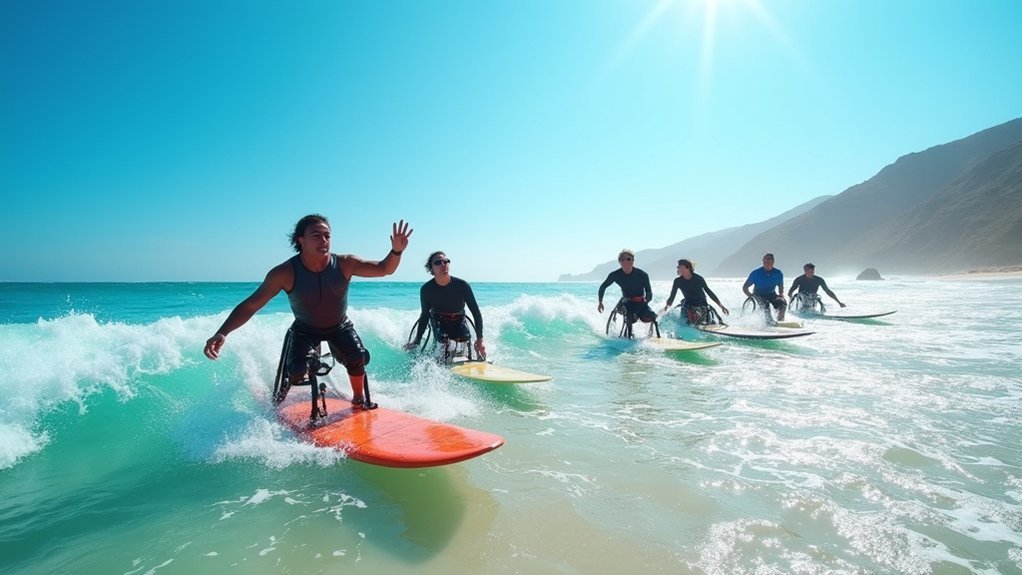
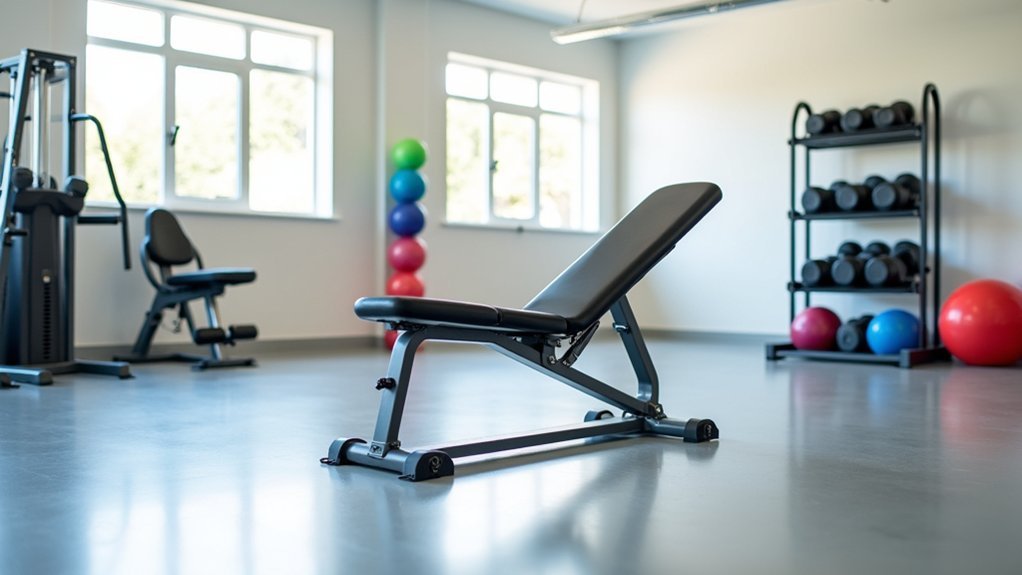
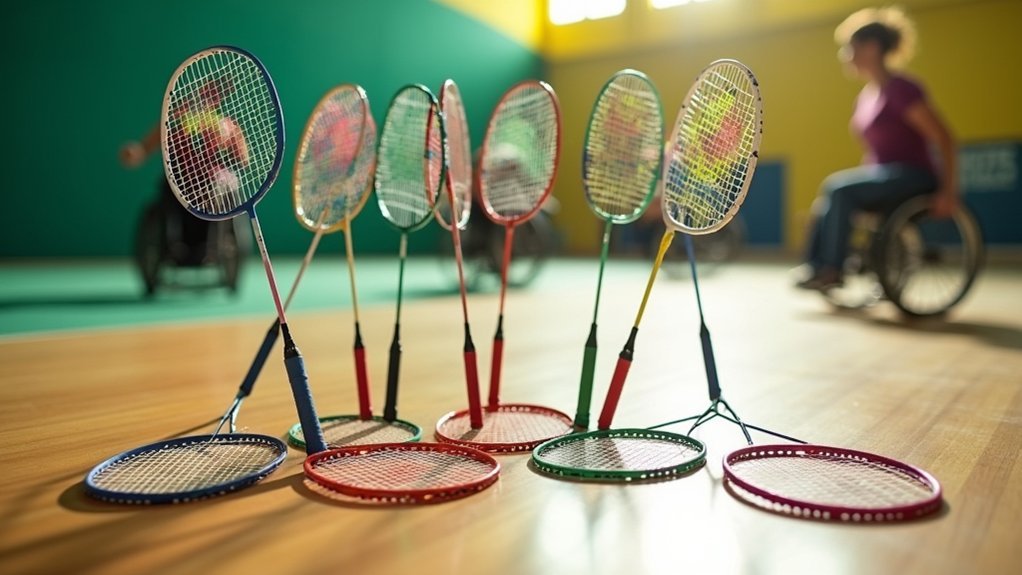
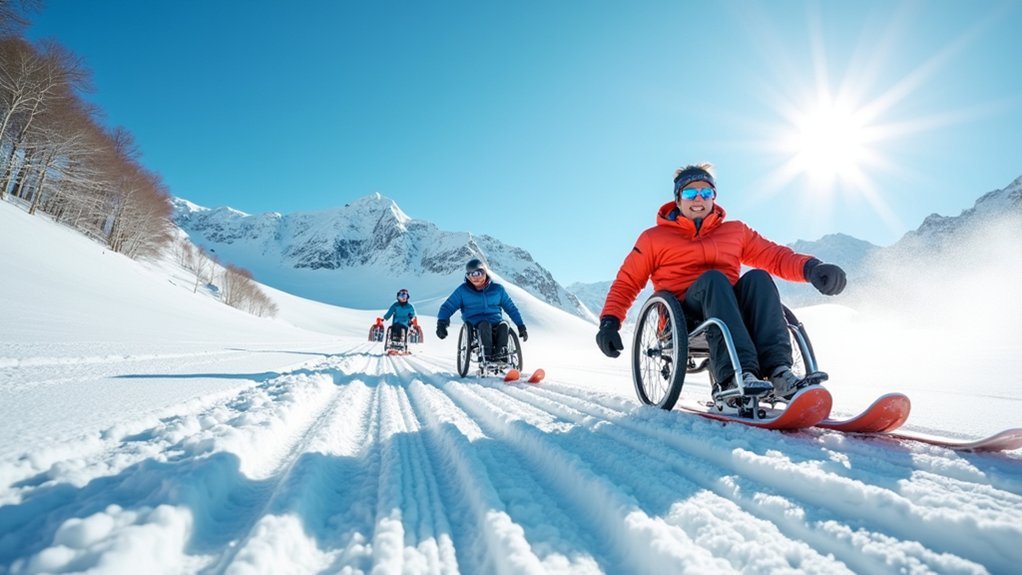
Leave a Reply